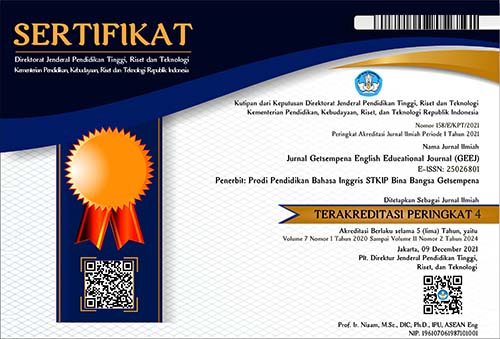LEARNING AUTONOMY AND ITS SIGNIFICANCE FOR INDONESIAN EFL LEARNERS
Abstract
The promotion of autonomy-based approaches to language learning has been increasingly applied in many countries, including Indonesia. This paper presents some recent theoretical studies on promoting English as Foreign Language (EFL) independent learning in several countries including Indonesia through the utilization of means and resources. Using media and technology through the Personal Learning Environment (PLE), computer-based materials, portfolio, and exposure to English Language resources has helped students in Switzerland, the United Kingdom, Spain, Portugal, Taiwan, and Indonesia where learning autonomy in English language learning is promoted. The writer also found out significance in promoting learners' autonomy regarding Indonesian education practices and socio-cultural beliefs and traditions. The need for autonomy suggests several strategies that should be promoted to Indonesian EFL learners so that their autonomy is well enhanced. This paper argues that autonomous learning is a good model for Indonesian EFL learners and should be considered as a premier strategy to enhance their English proficiency.
References
Andrade, M. S. & Bunker, E.L. (2009). A model for self-regulated distance language learning. Distance Education, 30(1), 47-61.
Benson, P. (2008). Autonomy In and Out of Class. A TESOL Symposium, Learner Autonomy: What Does the Future Hold? 1-12.
Bradford, A. (2007). Motivational Orientations in Under-researched FLL Contexts: Findings from Indonesia. Regional English Language Centre (RELC) Journal, 38(3), 302-323.
Chan, V. (2003). Autonomous Language learning: the teachers’ perspectives. Teaching in Higher Education, 8(1), 33-54.
Corria, I. L. (1999). Motivating EFL Learners. English Teaching Forum, 1-3, Retrieved from: http://exchanges.state.gov/englishteaching/forum/archives/docs/99-37-2-f.pdf.
Cotterall, S. (1995). Readiness for Autonomy: Investing Learner Beliefs. English Language Institute, 23(2), 195-205.
Cotterall, S. (2000). Promoting learner autonomy through the curriculum: principles for designing language courses. ELT Journal, 54(2), 109-117.
Crystal, D. (2003). English as a global language. 2nd edition. Cambridge: Cambridge University Press.
Exley, B. (2001). Meeting the needs of offshore learners: A case study of Australian EFL educators and Indonesian EFL learners. In proceedings Crossing borders: new Frontiers for Educational research, AARE 2001. Cultural and Language Studies. Queensland: Fremantle.
Figura, K. & Jarvis, H. (2007). Computer-based materials: A study of learner autonomy and strategies. School of Languages, 35, 448-468.
Gao, X. (2006). Strategies used by Chinese Parents to Support English Language Learning: Voices of ‘Elite’ University Students. RELC Journal, 37(3), 285-298.
Gao, X. (2008). The ‘English Corner’ as an Out-Of-Class Learning Activity. ELT Journal, 63(1), 60-67.
Gonzalez, J.A. (2008). Promoting student autonomy through the use of the European Language portfolio. ELT Journal, 63(4), 373-382.
Gordon, O. A. (2005). The Predisposition of Adult ESOL Learners in a FE College towards Autonomy. Journal of Further and Higher Education, 29(3), 191-210.
Hinkel, E. (2005). Handbook of Research in Second Language Teaching & Learning. Alwrence Mahwah: Erlbaum Associates. Retrieved from: http://scholar.google.com.au.proxy.library.adelaide.edu.au/scholar?q=Handbook+of+Research+in+Second+Language+Teaching+%26+Learning.+&hl=en&btnG=Search&as_sdt=2001&as_sdtp=on.
Hoven, D. & Crawford, J. (2001). Networking and communicating: Technological applications and implications for the learning of Indonesian and EFL. University of Technology, Canberra: AALA 2001.
Icmez, S. (2010). Learner Autonomy: What We Need to Foster and How. 143-152. Retrieved from: http://egitim.cukurova.edu.tr/efdergi/download/96.pdf.
Lamb, M. (2003). Integrative motivation in a globalizing world. School of Education, 32, 3-19.
Lamb, M. (2004). It Depends on The Students Themselves: Independent Language Learning at an Indonesian State School. School of Education, 17(3), 229-245.
Lengkanawati, N. S. (2004). How Learners from Different Cultural Backgrounds Learn a Foreign Language. Asian EFL Journal, 1-8.
Lestari, L. A. (2003). Should English be a Compulsory Subject in Primary Schools?. Language and Arts Journal, 31(2), 197-212.
Liaw, L. M. (2010) Cross-Cultural E-Mail Correspondence for Reflective EFL Teacher Education, The Electronic Journal for English as a Second Language, Tunghai University: Taichung. Retrieved from: http://www.tesl-ej.org/wordpress/past-issues/volume6/ej24/ej24a2/mlliaw@mail.thu.edu.tw.
Littlewood, W. (1999). Defining and Developing Autonomy in East Asian Contexts. Applied Linguistics, 20(1), 71-94.
Lo, Y. F. (2010). Implementing reflective portfolios for promoting autonomous learning among EFL college students in Taiwan. Language Teaching Research, 14(1), 77-95.
Nazari, A. (2007). EFL teachers’ perception of the concept of communicative competence. ELT Journal, 61(3), 202-210.
Nunes, A. (2004). Portfolios in the EFL classroom disclosing an informed practice. ELT Journal, 58(4), 327-335.
Novera, I. A. (2004). Indonesian Postgraduate Students Studying in Australia: An Examination of Their Academic, Social, and Cultural Experiences. International Education Journal, 5(4), 475-487.
Sanprasert, N. (2009). The application of a course management system to enhance autonomy in learning English as a foreign language. ScienceDirect, 38(1), 109-123.
Sert, N. (2006). EFL Student Teachers’ Learning Autonomy. The Asian EFL Journal Quarterly, 8(2), 180-201.
Smith, R. (2008). Key Concepts in ELT: Learner Autonomy. ELT Journal, 62(4), 395-397.
Spratt, M., Humphreys, G. & Chan, V. (2002). Autonomy and motivation: which comes first?. Language Teaching Research, 6(3), 245-266.
Vanijdee, A. (2003). Thai Distance English Learners and Learners Autonomy. Open Learning, 18(1), 75-84.
Yang, N. D. (2003). Integrating portfolios into learning strategy-based instruction for EFL college students. Department of Foreign Languages and Literatures, 41, 293-317.
Zacharias, N. T. (2005). Teachers’ belief about internationally-published materials: A survey of tertiary English teachers in Indonesia. RELC Journal, 36(1), 23-37.
Zea, C. R. and Bovey, N.S. (2008). A new learning model to support autonomous learning at the Language Center of the University of Lausanne. The Changing Face of Learning in Higher Education Institutions, Paper Proceedings of the 3rd International, SCIL Congress 2008, Taiga Brahm (Ed.) Gebert Ruf Foundation: University of St. Gallen P., 103-106.
























